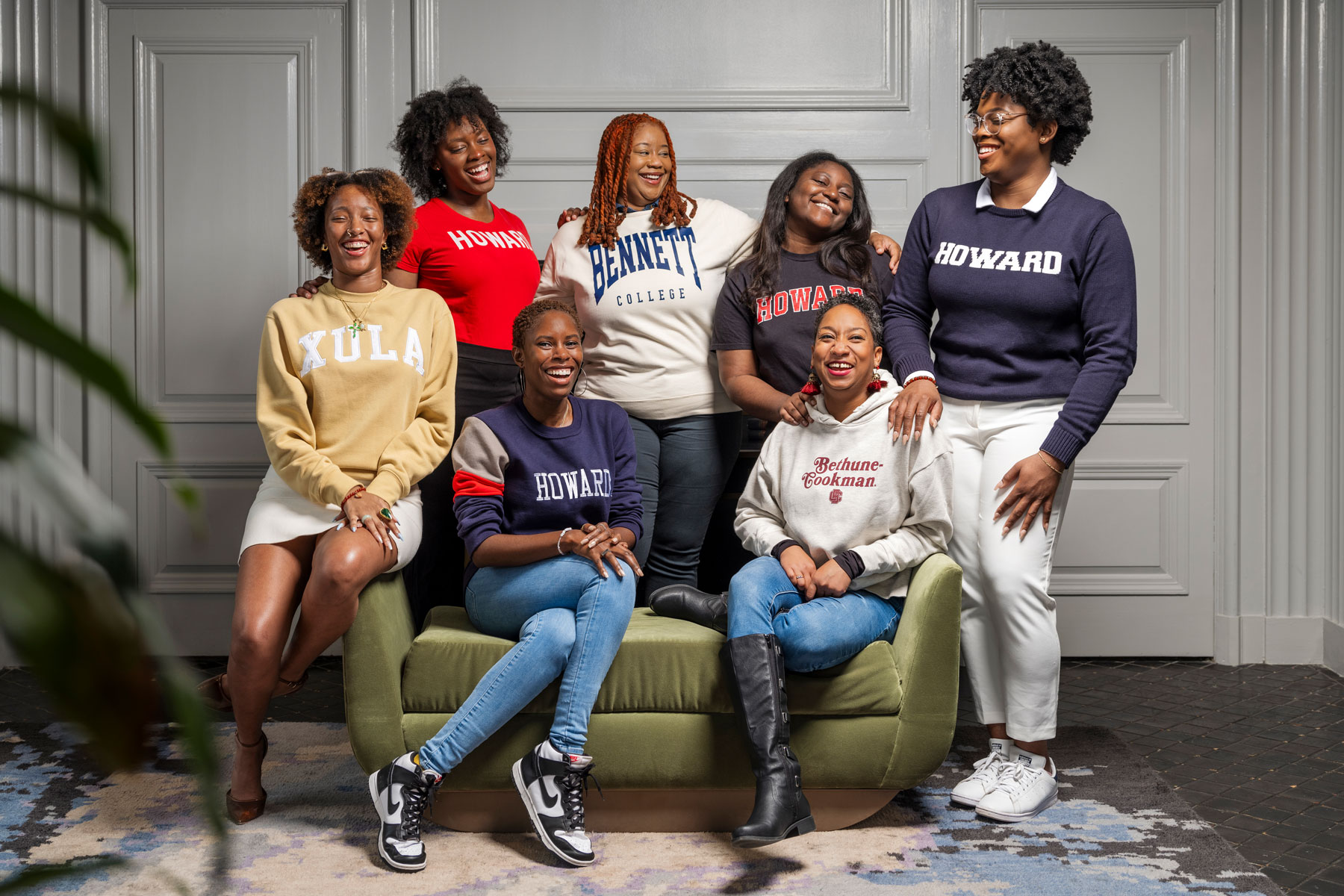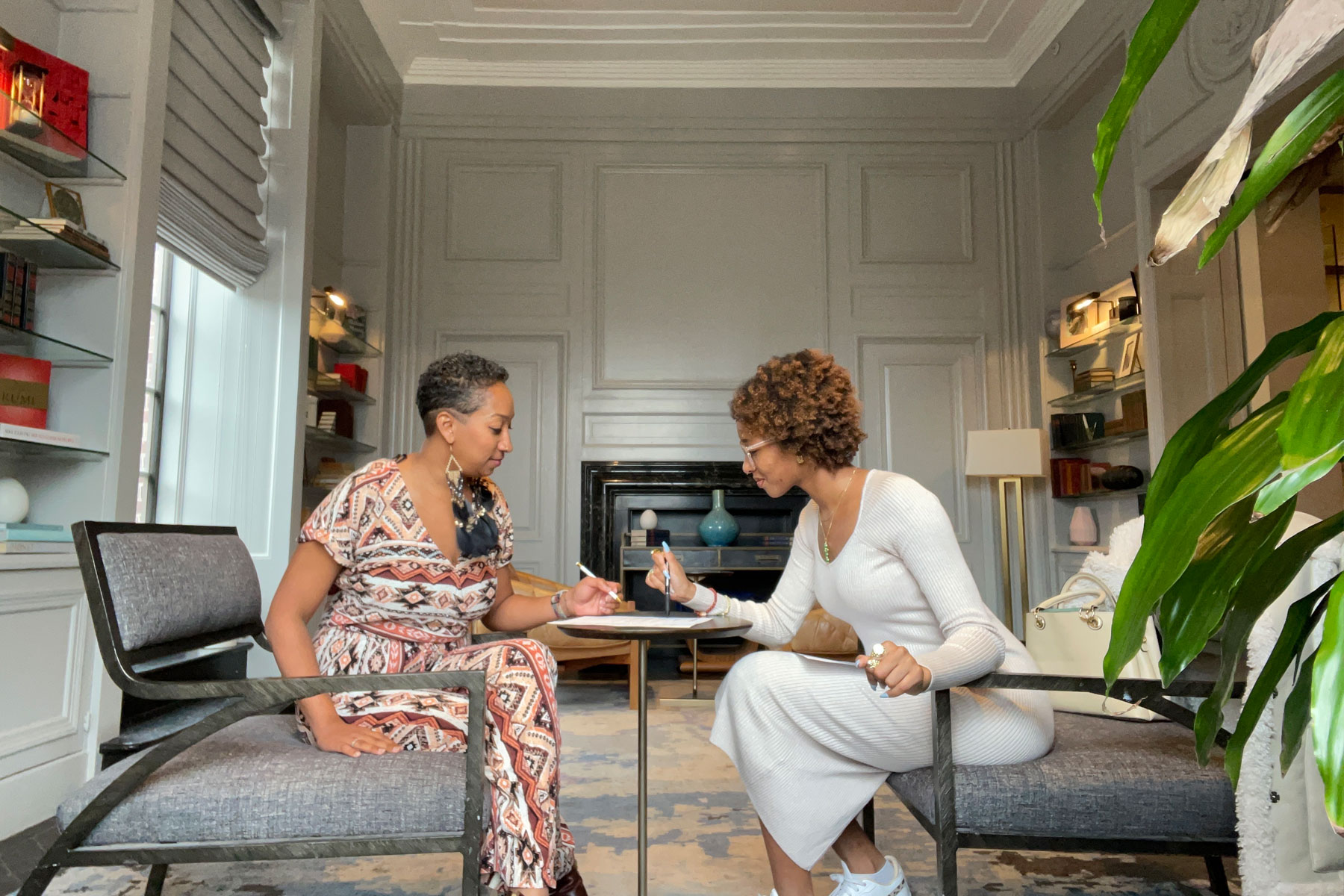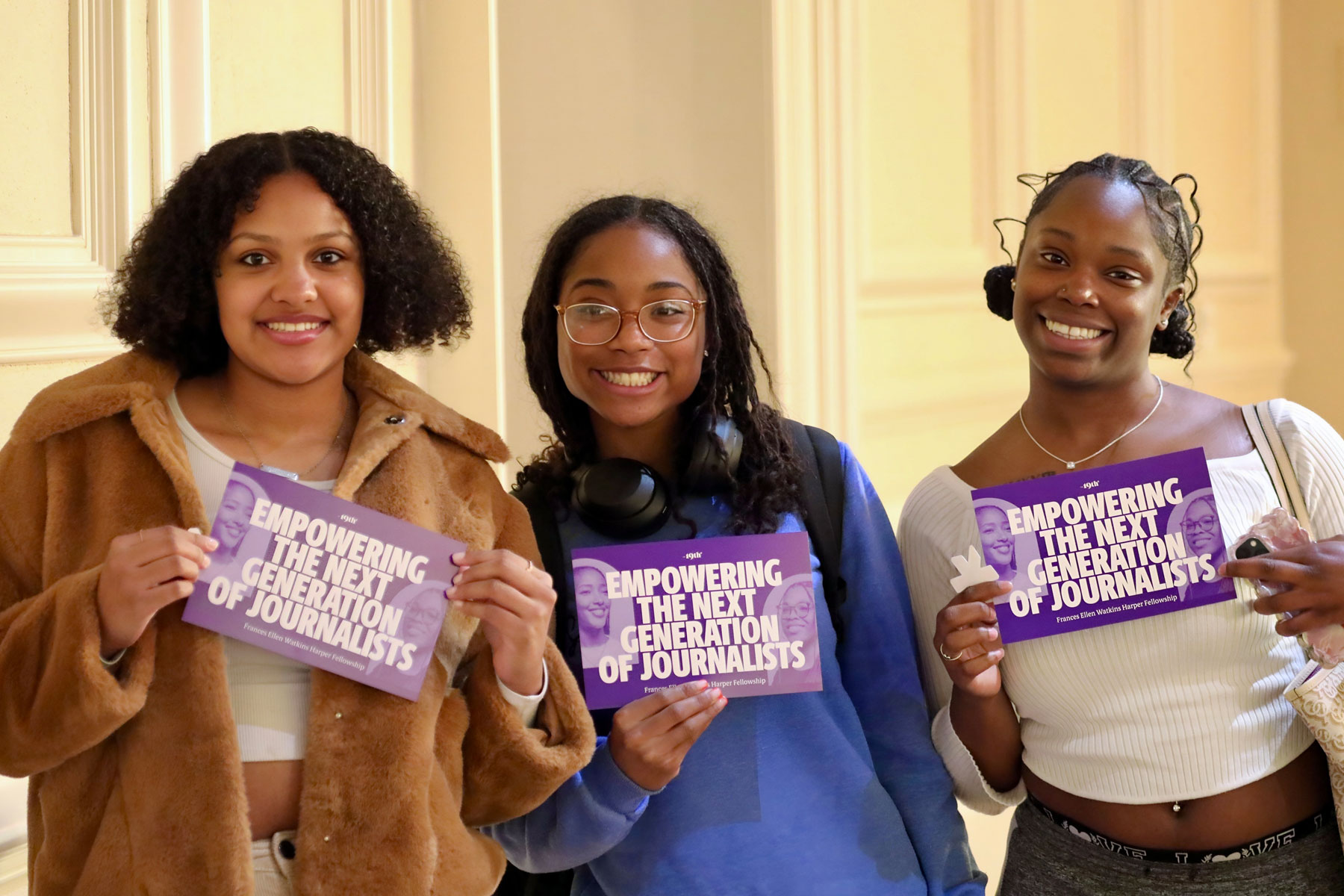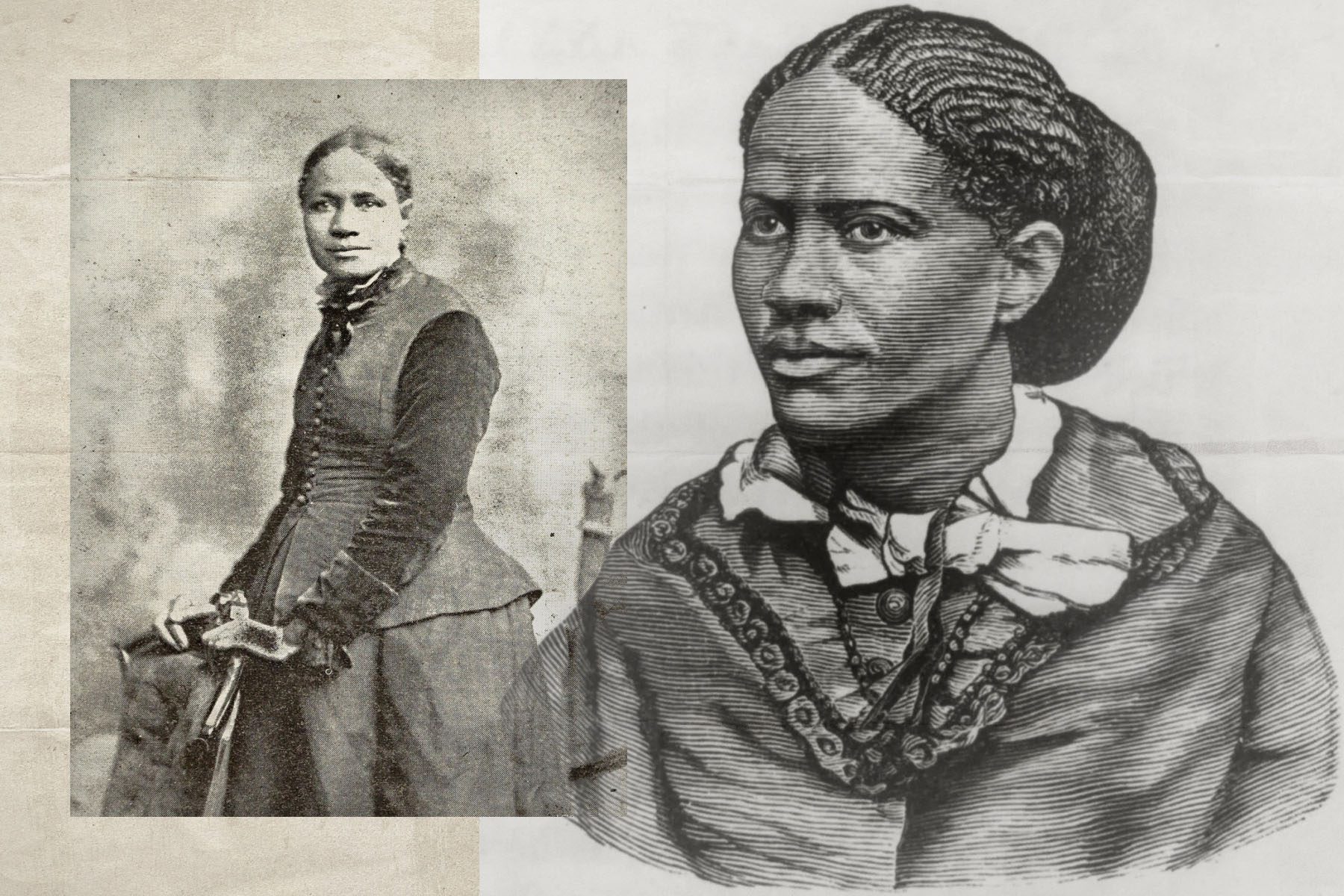
The 19th’s Frances Ellen Watkins Harper Fellowships
Applications for the 2025-26 Frances Ellen Watkins Harper fellowship have closed. Sign up to get occasional updates on fellowship info sessions, when applications open, 19th events near you and more.
Named for the “mother of African-American journalism,” the program was launched in 2022 to provide recent graduates, mid-career alums and former students of Historically Black Colleges and Universities with yearlong, salaried fellowships with full benefits in reporting, audience engagement and news product. Learn more about Frances Ellen Watkins Harper below.
Meet our 2024-25 fellows and see their work. You can also explore the work of our 2023-24 fellows and our 2022-23 inaugural fellowship cohort.
About the program
Frances Ellen Watkins Harper Fellows will spend a year working in reporting, audience engagement and product roles with full-time salaries and benefits, made possible by the generous support of Michelle Mercer and Bruce Golden. Fellows are embedded in their respective teams and receive mentorship and professional development. We also provide career coaching to prepare fellows for their path after their fellowship.
Fellowship tracks
Our cohorts include three reporting fellows, one audience engagement fellow and one product fellow.
Fellows in the reporting track should expect to gain more experience in:
- Covering issues deeply through original reporting, researched context and nuanced framing
- Pitching stories they want to follow through the lens of equity and representation
- Identifying and developing areas of expertise within their reporting
- Exploring storytelling across digital platforms and in-person events
- Centering the voices and experiences of people on the margins, who are often affected the most at the intersections of gender and policy
See stories reported on by our 2023/2024 and 2022/2023 fellows.
Fellows in the audience engagement track should expect to gain more experience in:
- Finding, pitching, producing and reporting out audience-centric stories that live first and foremost on off-platform channels like Instagram. For example, our callout for Black country music fans, or our roundup of Women’s History Month quotes from our current fellow cohort
- Optimizing and distributing journalism across platforms — such as on our site, via search, on social and in newsletters — to meet different audiences where they are
- Crafting accurate, compelling headlines, social and newsletter copy, and visuals on deadline
- Working with different roles across editorial, audio, event and product teams to execute on audience engagement projects
- Using key newsroom platforms and tools to draft and schedule social media posts, update our homepage, monitor real-time metrics and trending topics, and produce an article or newsletter
Fellows in the product track should expect to gain more experience in:
- Using design thinking to generate product ideas that meet audience needs, align with our mission and advance business goals
- Defining new features and experiments to test on our products, including our website, newsletters and aggregation apps such as Apple News
- Writing requirements and working with our technology team to test and ship products
- Measuring and defining the impact of our features and experiments
- Conducting user research and synthesizing learnings
- Contribute to roadmapping and quarterly planning
- Communicating goals and plans with stakeholders and triaging their feedback

The fellowship year
The fellowship year kicks off in the fall with an opening retreat for new fellows, held in conjunction with a 19th event in a different city every year. Both new and outgoing fellows have the chance to connect and community build. New fellows have sessions that set them up for the year and beyond, like building influence and managing up, while outgoing fellows celebrate the end of their fellowship.
Key features of the fellowship:
- A year of learning. In addition to being embedded on their respective teams, fellows experience a robust curriculum of relevant training throughout the fellowship, shaped in tandem with the cohort’s input. Previous workshops have included coping with trauma and burnout, networking, negotiating salary, revamping résumés and portfolios, tips from hiring managers, mental wellness and financial literacy. Trainers have hailed from The New York Times, American Press Institute, KHN, WHYY, AJ+, Poynter and more.
- Growing your journalism network. The 19th supports fellows’ career progression by coordinating networking opportunities for fellows with journalists and hiring managers in media throughout the year via networking happy hours and hiring manager panels. The 19th covers one year of membership in the National Association of Black Journalists as well as fellows’ attendance to NABJ’s annual convention and career fair during their fellowship year.
- Legendary retreats. Fellows have an opening retreat at the start of the fellowship year to prepare them for the year ahead. As part of the retreat, they also attend a 19th event. At the midpoint of the fellowship, usually in early spring, fellows have a midyear retreat in Philadelphia where program namesake Frances Ellen Watkins Harper once lived. This retreat focuses on job preparation with resume and portfolio workshops, a networking happy hour and more. In late spring, fellows join the rest of The 19th staff at an all-staff retreat that focuses on learning, strategy and fun. Finally, fellows end the fellowship year with a fall celebration where they also connect with new fellows who are just beginning their year. In all, fellows attend four retreats – three fellowship-related and one with all staff. Accommodations for remote participation are also available.
- Finding your career path. All fellows receive 1:1 goal-setting and coaching from The 19th’s director of fellowships, with support from people operations and very committed staff across the organization, including editor-at-large Errin Haines. Fellows also receive six months of coaching through Digital Women Leaders in the final three months of the fellowship and three months after the fellowship as they transition in their careers.
Fellows’ are supported by URL Media in landing their next journalism role. This includes personalized coaching, help identifying roles and connecting with employers, salary and offer guidance, visibility in URL’s extensive news networks and long-term career planning.
- Professional development. Like all 19th staff, fellows receive a professional development stipend and are encouraged to seek out growth and learning opportunities. Previous fellows have completed Coursera courses and attended journalism conferences and seminars.
- A bonus benefit. Fellows go through detailed and constructive performance reviews mid-fellowship to expose them to the process, so they are comfortable doing so in future roles. Fellows receive a one-time merit bonus once reviews are complete.

Who can apply
Eligible candidates should be any one of the following:
- A recent graduate (within two years of graduation), early-career (three to four years’ experience) or mid-career alum (5-10 years’ experience) of a Historically Black College or University
- A graduating senior of a Historically Black College College or University with a graduation date prior to the anticipated fellowship start date of October 2025
- An individual who attended a Historically Black College or University for at least two years, and either transferred or did not graduate
- All applicants must be legally authorized to work in the United States. This can include conditional student/work visas, provided The 19th will not be required to take additional steps in sponsorship
Eligible candidates should also have the following:
- Some relevant experience in their chosen fellowship track
- A genuine interest in growing their career in journalism
- Alignment with The 19th’s values and community guidelines
Fellowship benefits
- $1,500 merit bonus midway through the fellowship
- $1,000 professional development stipend, which previous fellows have used to do online courses or attend journalism conferences
- $480 work-from-home stipend and $480 wellness stipend ($960 total) paid over the course of the year
- $100/month for coworking space membership (optional)
- Mac laptop, which fellows keep after the fellowship ($1,300-$1,500 value)
- Access to the fellowship’s hardship fund (up to $5,000 per fellow)
- Membership to the National Association of Black Journalists and attendance to their annual convention and career fair
- A mentor in their fellowship track through the Digital Women Leaders network
Fellows will also be eligible for most 19th employment benefits, including:
- Vacation Time Off (20 days per year)
- Sick Time Off (10 days per year)
- Personal Days (6 days per year)
- Paid Holidays (20 days in 2024)
- Paid Family Leave (100% up to 6 months)
- Caregiver leave (100% up to 4 months)
- 401(k) Plan (up to 3.5% matching on 6% contribution)
- Flexible Spending Plan (for qualifying medical or child care expenses)
- Health Savings Account
- Health, vision, and dental insurance (100% covered by The 19th for employee/60% for dependents)
- Long Term and Short Term Disability insurance
- Life insurance
- Company expense account

How to apply
When submitting an application, prospective fellows will need to submit the following:
- A cover letter explaining why you want to work at The 19th, how our mission aligns with your career goals and interests and what impact this fellowship program would have on your career goals
- Your résumé
- Relevant samples of your work
Feel free to reach out to [email protected] if you have any questions not answered in the Frequently Asked Questions on this page.
Support fellowships at The 19th
Are you interested in supporting fellowships at The 19th? Please email [email protected] for more details.
Frequently Asked Questions
-
How much are fellows paid?
Fellows receive a salary of $70,000-$75,000 depending on the fellowship track they are selected for. This also includes generous benefits. Fellow salaries do not exceed this range to ensure salary equity across all levels at The 19th.
-
What benefits are included?
Fellows will be eligible for most 19th employment benefits, including:
- $1,500 merit bonus midway through the fellowship
- $1,000 professional development stipend, which previous fellows have used to do online courses or attend journalism conferences
- $480 work-from-home stipend and $480 wellness stipend ($960 total) paid over the course of the year
- $100/month for coworking space membership (optional)
- Mac laptop, which fellows keep after the fellowship ($1,300-$1,500 value)
- Access to the fellowship’s hardship fund (up to $5,000 per fellow)
- Yearlong membership to the National Association of Black Journalists and attendance to their annual convention and career fair
- A mentor in their fellowship track through the Digital Women Leaders network
-
Where are fellowships located?
Fellowship positions are remote so fellows can reside anywhere in the United States. Some portions of the fellowship involve travel for 19th convenings, conferences or storytelling. The 19th does not provide relocation assistance to fellows.
-
What criteria do you look for when selecting a fellow?
We consider different criteria depending on the track for which the fellow is being considered (audience, product or reporting). More generally, we look for:
- Some experience in the candidates’ track of interest, whether that’s through internships, campus media or a previous role
- A clear, defined intent to work in news long-term, in alignment with our goal of creating a pipeline into U.S. newsrooms
- The ability to work collaboratively and empathetically in ways that contribute positively to the dynamic of the fellows’ cohort and the fellow alumni community
- The ability to be self-driven. We provide opportunities, structure and support, but fellows also must be able to make the most of those, and direct what they’d like to learn and be involved in, and the areas in which they’d like to grow
- The talent to thrive in journalism, but perhaps not the access to opportunities in national newsrooms or legacy pathways into the industry
- A consumer of news who has curiosity and interest in what’s going on in the world
- Close and articulated alignment with The 19th’s mission and values and community guidelines
-
Can I switch tracks during the year?
tOnce fellows have been chosen for a particular track, they’ll need to stay in that track for the course of the year. However, fellows do have the opportunity to collaborate with each other and across teams and projects.
-
Can I freelance for The 19th once the fellowship is over?
Although some teams work with contractors on a project basis, The 19th doesn’t currently commission freelance stories. We encourage you to stay connected with us and check our careers page for future full-time opportunities.
-
What if I can’t complete a full year of the fellowship?
We ask that fellows commit to completing a full year in the fellowship. In the event that a fellow is unable to complete a full year due to unforeseen circumstances that arise during the year, we’ll consider deferring their fellowship spot to the following year as space and resources permit.t
-
Is there travel involved with the fellowship?
Some portions of the fellowship require fellows to travel. Fellows attend four in-person retreats, including a midyear retreat in Philadelphia where program namesake Frances Ellen Watkins Harper once lived. It may also include travel for conferences and/or storytelling. Accommodations can be made based on a fellow’s need.
-
Will The 19th hire me as full-time staff after the fellowship?
The fellowship lasts for one year, and we cannot guarantee employment at The 19th after it ends. However, we support fellows in preparing for their next career move throughout the fellowship. This includes tapping into our networks to help them explore opportunities at organizations they’re interested in, as well as providing guidance on applications and interviews.
-
How will this fellowship help me land my next role?
- Networking opportunities with journalists and hiring managers in media throughout the year via networking happy hours and hiring manager panels
- Résumé feedback from HR professionals in news, résumé coaching and a portfolio workshop
- One year of professional membership in the National Association of Black Journalists and attendance to NABJ’s annual convention and career fair during their fellowship year
- Dedicated time to work on résumés, portfolios, employer research and hiring manager outreach
- Support from URL Media through personalized coaching, help identifying roles and connecting with employers, long-term career planning and more
- A robust curriculum that equips fellows with the skills to secure and thrive in their next role, ex. salary negotiation, interview practice and managing up
- A job application tracker that allows 19th staff to offer tailored insights, connections and guidance to amplify fellows’ efforts and networks
- Six months of coaching through Digital Women Leaders in the final three months of the fellowship and three months after the fellowship as they transition in their careers
-
Can I hold down a full-time job and do the fellowship simultaneously?
To ensure that you get the most out of this fellowship, we require fellows to commit fully to the program and not hold other jobs, except in rare cases. This is a full-time role that includes a comprehensive career-training curriculum and travel throughout the year for conferences, staff retreats and, potentially, storytelling opportunities. We want fellows to have the time and space to fully engage—both in their specific roles and as part of a learning community with their cohort.
t
-
Can I apply for a fellowship if I’m a senior now, but will have graduated by the time the fellowship begins?
Yes, you can apply for a fellowship if you’re a senior, as long as your graduation date is before the anticipated fellowship start date in the fall.
-
Is this fellowship only for women?
The fellowship is open to everyone, as long as they’ve attended an HBCU for at least two years and are legally authorized to work in the United States. If you’re passionate about the kind of journalism we do and meet the eligibility criteria, we’d love for you to apply!
-
Can I apply if I haven’t attended an HBCU?
To be considered for fellowships, applicants must have attended an HBCU for at least two years. Applications that do not meet this requirement will not move forward for review. The fellowship is open only to recent graduates, mid-career alumni and former students of HBCUs. Under the fellowship’s eligibility criteria, Minority Serving Institutions (MSIs) are not classified as HBCUs. HBCUs are open to all students and give education access to students of all races, colors, national origins, religions, abilities and familial statuses. The 19th will consider candidates of all backgrounds as long as they meet the HBCU attendance requirements. We’re looking to expand the fellowship in the future, so please stay tuned for updates!
-
Why can only people who attended HBCUs apply for the fellowship?
The fellowship program’s funding is specifically designated to support HBCU alumni and former students. HBCUs welcome students from all backgrounds and provide access to education for people of all races, national origins, religions, abilities and familial statuses. The 19th will consider applicants from all backgrounds, as long as they meet the HBCU attendance and work authorization requirements.
-
Do I have to be a U.S. citizen or resident to be eligible for this fellowship?
You aren’t required to be a U.S. citizen or resident to be eligible for the fellowship. However, you must be legally authorized to work in the United States. This can include conditional student or work visas, provided that The 19th will not be required to take additional steps in sponsorship.
In circumstances where we’re able to accept non-citizens or non-residents on conditional student visas, we’d require for tax purposes that the fellow reside in the U.S. and be able to be paid as a U.S. employee.
If you’re currently a graduating senior who is also an international student, you can talk to your institution and/or international student advisor about Optional Practical Training (OPT) for F-1 students.
About Frances Ellen Watkins Harper

Born in Baltimore to free Black parents, Harper was a prolific writer and a correspondent for anti-slavery newspapers, including Frederick Douglass’ The Liberator. She was also a traveling abolitionist and orator who used the Underground Railroad to help people escape slavery. Over the course of her life, she was deeply and actively engaged in the women’s suffrage movement, breaking with the likes of Elizabeth Cady Stanton and Susan B. Anthony over their unwillingness to prioritize the voting rights of Black men. She was the cofounder of the National Association of Colored Women.
Harper embodied The 19th’s asterisk — she was never once able to cast a ballot. But she did not let this disenfranchisement stifle her activism or her civic engagement.
She gave a famous speech at the 1866 National Women’s Rights Convention, “We Are All Bound Up Together,” in which she spoke bluntly about White women’s suffrage: “I do not believe that White women are dew-drops just exhaled from the skies. I think that like men they may be divided into three classes, the good, the bad and the indifferent … You White women speak here of rights. I speak of wrongs.”
Harper was one of the first Black women to be published in the United States: She was the first Black woman ever to have a short story published commercially, she was the most popular Black poet before Paul Laurence Dunbar (she published 80 poems), and her novel, “Iola Leroy,” was one of the first books published by a Black woman. The author was 67 when it debuted.
She also predated Rosa Parks in refusing, in 1858, to give up her seat or ride in the “colored” section of a segregated trolley car.
Harper was a friend and mentor to other Black writers and journalists, including Ida B. Wells. She died in 1911 in her adopted home of Philadelphia.